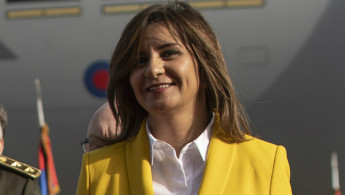"Anyone who says anything about our country, what happens to them?" Nabila Makram asked during a private party for Egyptian diaspora members in the Canadian economic capital Toronto.
"We cut," she said, raising her hand to her throat in a move that triggered laughter in the room but also raised concerns that she was condoning violence.
Mohamed Kamel, a member of the board of directors of the Egyptian Canadian Coalition for Democracy, told Radio-Canada on Tuesday that the remarks were "very dangerous and unacceptable."
"It reminds us of the Jamal Khashoggi case," he said, referring to the Saudi journalist who was murdered and dismembered last year at the Saudi Arabian consulate in Istanbul.
Makram's comments came during a speech in which she said, "Egypt embraces all of us and brings us closer together. Wherever we go, it stays in our hearts and we can't tolerate anything said about it outside."
Her ministry's Twitter account on Tuesday quoted her as being surprised by the "misinterpretation" of her statements, saying she had no violent intent.
The ministry said "I cut his throat" is a "common expression in the Egyptian dialect which signifies when someone is very angry."
"The state is protecting its children and not threatening them," Makram said via her ministry, and is facing "a fierce war and groups that are seeking to divide and minimize achievements and successes."
Egypt's President Abdel Fattah al-Sisi has faced international condemnation for a crackdown on civil society groups since he took power in 2014, a year after the military toppled Islamist president Mohamed Morsi.
Rights groups have regularly accused his government of human rights violations and repression of dissidents.





 Follow the Middle East's top stories in English at The New Arab on Google News
Follow the Middle East's top stories in English at The New Arab on Google News
![Netanyahu furiously denounced the ICC [Getty]](/sites/default/files/styles/image_330x185/public/2024-11/GettyImages-2169352575.jpg?h=199d8c1f&itok=-vRiruf5)
![Both Hamas and the Palestinian Authority welcomed the ICC arrest warrants [Getty]](/sites/default/files/styles/image_330x185/public/2024-11/GettyImages-2178351173.jpg?h=199d8c1f&itok=TV858iVg)
